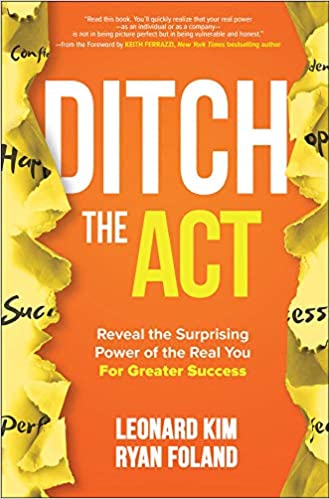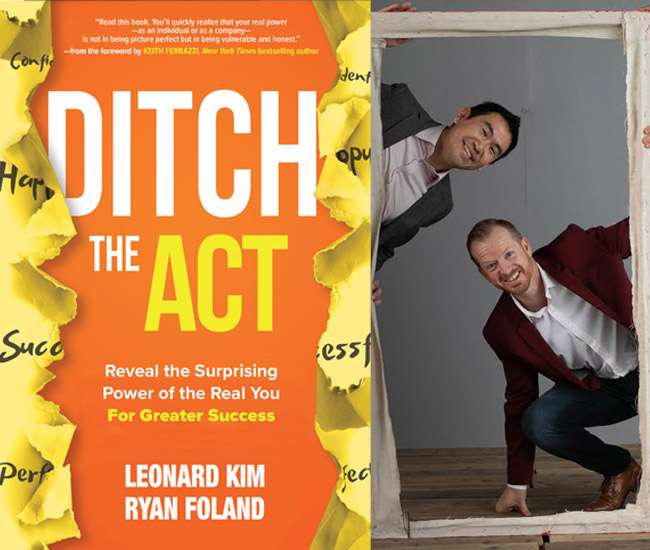Ditch the Act
What's It About?
You’re familiar with the saying “it is better to have tried and failed than not to have tried at all.” Now, how about wearing that failure on your sleeve like a Red Badge of Courage?The premise behind Ditch the Act: Reveal the Surprising Power of the Real You for Greater Success (McGraw-Hill Education) is that showing vulnerability and authenticity is a better strategy in business and life than the stereotypical polished persona you always believed would win friends and influence people. So basically, ditch the act.
Until now, people who have openly talked about their failures, it seems, are people who have experienced a fair degree of success and can laugh at their miscues. But authors Leonard Kim and Ryan Foland preach that sharing your real inner self is in fact the very roadmap to succeeding in the first place.
“I consult with some of the biggest brands in the world, and what I constantly see lacking in executive leadership is the candor to let their authentic selves shine through,” writes Keith Ferrazzi, bestselling author of Never Eat Alone and Who’s Got Your Back in the book’s foreword. You need to “position your ‘not so good’ moments into teachable lessons that make you more approachable and, frankly, more human.”
If 50 percent of new businesses don’t last five years and 50 percent of marriages end in divorce, why sweep the reality and lessons of half our existence under the rug? Kim and Foland set out to demonstrate how “revealing your failures and weaknesses is an essential element in building and sustaining a viral personal brand to help propel your relationships, your career and/or your business.”
One’s natural tendency, they explain, is to “hide our skeletons in our closets – not just the things we’ve done but the things done to us – and construct facades of perceived strengths. The trouble is facades and false images hide who we really are and block true, authentic connections.”
The well-credentialed authors – recognized as leading marketers on Top TED Talk lists, by Entrepreneur magazine and Inc. magazine – note that it is easy to listen to someone else’s tales and how they overcame failure to come out successfully at the other end. But it’s difficult to apply that thinking, that vulnerability, to our own lives and project that image. Admittedly, the process can be scary.
The authors pepper the book with personal anecdotes to reinforce points from their own experiences, and lay out a practical eight-step “Expose Yourself Process” designed to help readers use the fresh exposure and lessons to drive brand differentiation and growth.
Key to that process is a tool they call an “Exposure Resume.” A first glance at their example in the book will make you chuckle:
2014 Worked at Pepsi…Quit
2016 Made startup…Failed
2017 Met love of life…Broke up
2018 Went back to school…Got degree
2020 Director of Human Resources…Promoted
Sounds real, doesn’t it? But would you dare write it that way? People used to employ sugary wording on their resume to hide the fact they were laid off or let go. Not necessary, say Kim and Foland.
“It doesn’t matter what challenges you face,” they write. “As the end of each situation, you come out alive. That means your personal brand follows you around until the day you die.”
The authors help you build your own Exposure Resume by first asking you to answer three questions:
- What is the secret that you’ve been hiding from everyone because you’re fearful of what others may think of you?
- What are you so scared of telling others about that event, and what makes you feel so ashamed about it?
- How do you feel people would react and think of you if you told them the truth?
If you fear that you will look weak to others, they write, the truth is you won’t. The Exposure Resume, they say, will serve as your source as you prepare an authentic bio for yourself.
“I’ll admit I wasn’t the most vulnerable leader for most of my career,” says Target’s Senior VP of Operations Kamau Witherspoon. “In fact someone on my team said I was ‘prickly to get to know.’ I focused too much on being ‘polished’ and didn’t share much about who I was outside of work.”
“That changed when our six-month-old son was diagnosed with stage 3 neuroblastoma. I was scared and simply couldn’t hide it. In fact I decided to not even try. They embraced me and my family in ways I couldn’t have imagined. Even delivered some of the best results the team has ever achieved. That mask I took off I’ve tried to leave behind for good.”
Ditch the Act is “a lifestyle,” for those who have had enough of trying to build their brands – personal and/or professional – via an appearance believed others might admire, based on societal standards. “It’s a book,” the authors write “for those who are ready to ditch the act and stop working so hard for something they aren’t.”
The biggest branding mistake people can make, say Kim and Foland, is only projecting an image of their good side. “They minimize, spin, and shade around the truth…then wonder why their brand isn’t quite connecting with others.”
If you want to “harness the power of vulnerability and authenticity to build a better, more believable, more profitable personal brand…and enjoy a clean conscience while doing it,” then ditch the act and pick up Ditch the Act.
Ditch the Act is available for purchase.
Learn more about Leonard Kim and Ryan Foland on their Author Profile pages.
Buy this Book!
Amazon




